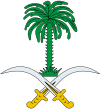- Crime in Saudi Arabia
-
Foreign affairs ministries of different countries state that there is a low rate of crime in Saudi Arabia.[1][2][3] However criminology researcher Dr. Ali Wardak in the book Transnational and Comparative Criminology suggested ranking societies on the basis of official crime rates is problematic. He argued it is possible in Saudi Arabia that several criminal complaints are resolved outside formal judicial institutions and as a consequence remain undocumented by the police.[4]
"Crime in Saudi Arabia is relatively low when compared to some developed nations, but may be increasing due to higher levels of foreign workers and higher levels of unemployment among Saudi residents."
— John Wilson, on the crime situation in Saudi Arabia, in the book International Security and the United States: An Encyclopedia[5]Petty theft is a problem especially in crowded areas.[1] The nation has strict laws prohibiting drug trafficking; drug trafficking meets capital punishment.[6] Saudi Arabia has signed all the three international conventions on drug control.[7] To curb money laundering, improved anti-money laundering laws have been enacted.[6] The country has implemented all the forty recommendations of the Financial Action Task Force on Money Laundering (FATF) for combating money laundering and all the eight recommendations of the FATF regarding terror financing. A Financial Intelligence Unit is also set up for the purpose of monitoring flows of funds.[8]
The most common crime in 2002 was theft, which accounted for 47% of total crime in the nation.[5] Saudi Arabia is a destination point for workers from South and Southeast Asia who are subjected to conditions which include involuntary servitude, non-payment of wages, confinement and withholding of passports as a restriction on their movement. Domestic workers are particularly vulnerable because some are confined to the house in which they work unable to seek help. Saudi Arabia is also a destination country for children trafficked from other Middle Eastern countries like Yemen, African countries like Nigeria, Mali, Somalia and Sudan and Asian nations like Pakistan and Afghanistan for the purpose of forced begging and involuntary servitude as street vendors. Some Nigerian women were reportedly trafficked into Saudi Arabia for commercial sexual exploitation.[6]
Threat of Islamic terrorism is a matter of concern.[9] The Department of Foreign Affairs and Trade (DFAT) of the Government of Australia claimed they received reports that terrorists are masterminding attacks against assets belonging to the Government of Saudi Arabia, oil infrastructure, aviation infrastructure, embassies, hotels, shopping malls and many Western interests such as residential housing complexes, gatherings of foreign tourists for recreational or cultural activities etc.[1] The United States Department of State reported "There is an on-going security threat due to the continued presence of terrorist groups, some affiliated with al Qaida, who may target Western interests, housing compounds, and other facilities where Westerners congregate".[10] Terrorist attacks in the country targeted both native people and foreigners. DFAT further stated "Terrorist attacks could occur at any time, anywhere in Saudi Arabia, including in Riyadh, Khobar, and other major cities".[1]
In 1988, the murder rate in Saudi Arabia was 1.1 per 100,000 population, the rate of sexual offenses was 21.9 per 100,000 population, and the rate of theft offenses was 70.5 per 100,000 population.[11] In 2002, a total of 84,599 crimes were reported in Saudi Arabia which was 387 crimes for every 100,000 people.[5]
The Saudi legal system is based on Islamic law and thus often prohibit many activities that are not crimes in other nations, but are deemed to be immoral. One of the main organizations enforcing traditional Islamic morality in the kingdom is the Committee for the Promotion of Virtue and the Prevention of Vice. It is difficult to know, with any certainly, how many people have been charged or punished for violating these sort of laws, i.e. the ban on alcohol, pork products, non-Islamic religious symbols or text, public displays of affection, indecent artwork or media images, homosexuality, cross-dressing, fornication or adultery.
References
- ^ a b c d Saudi Arabia Government of Australia, Department of Foreign Affairs and Trade
- ^ Saudi Arabia Foreign and Commonwealth Office
- ^ Saudi Arabia Department of Foreign Affairs
- ^ James Sheptycki, Ali Wardak, James Hardie-Bick (2005). Transnational and Comparative Criminology. Routledge Cavendish. pp. p93. ISBN 1904385052.
- ^ a b c Karl R. DeRouen, Paul Bellamy (2007). International Security and the United States: An Encyclopedia. Greenwood Publishing Group. pp. p674. ISBN 0275992535.
- ^ a b c Saudi Arabia The World Factbook
- ^ Country Profiles - Saudi Arabia United Nations Office on Drugs and Crime
- ^ First independent human rights organization in Saudi Arabia
- ^ Watching a Saudi Succession The New York Times
- ^ Saudi Arabia United States Department of State
- ^ James Sheptycki, Ali Wardak, James Hardie-Bick (2005). Transnational and Comparative Criminology. Routledge Cavendish. pp. p95. ISBN 1904385052.
 Saudi Arabia topics
Saudi Arabia topics- Index
- Outline
History 
Geography Law Politics - King
- Cabinet
- Allegiance Council
- National Security Council
- Consultative Assembly
- Foreign relations
- Nuclear program
- Mabahith (secret police)
Military Economy Society - Censorship
- Crime
- Demographics
- Education
- Healthcare
- Human trafficking
- Obesity
- Prostitution
- Religion
- Terrorism
Culture Symbols States with limited
recognition- Abkhazia
- Nagorno-Karabakh
- Northern Cyprus
- Palestine
- Republic of China (Taiwan)
- South Ossetia
Dependencies and
other territories- Christmas Island
- Cocos (Keeling) Islands
- Hong Kong
- Macau
Categories:
Wikimedia Foundation. 2010.
